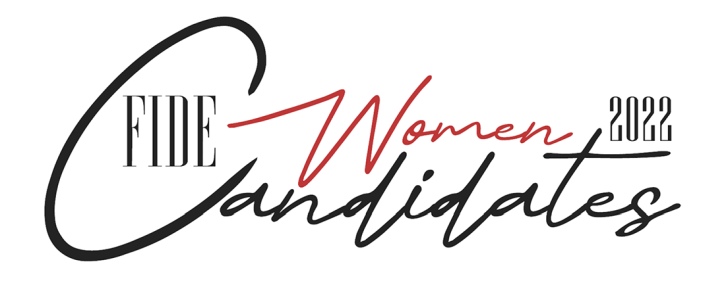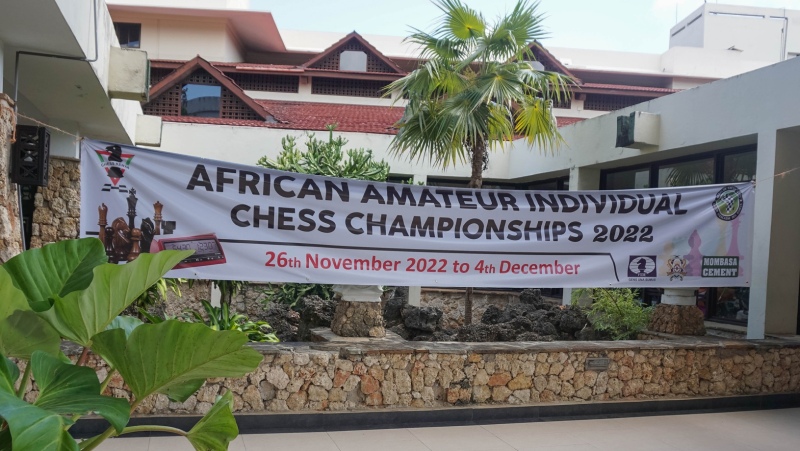From Monaco to Khiva: Women’s Candidates continue on the Silk Road

The first game of the 2022 Women’s Candidates Pool B kicked off this afternoon in the walled city of Khiva – a remote desert oasis on the Silk Road in Uzbekistan. In light of the country’s current chess boom, due to the many recent outstanding results by their national team, the federation bid for this event. Surrounded by glittering madrassahs, mosques and minarets and under the watchful eyes of chief arbiter Husan Turdialiev (International arbiter from Uzbekistan) and Berik Balgabaev (Advisor to the FIDE President), the games began punctually at 3 pm local time in the magnificent Farovon Hotel venue. Amongst other authorities, the Governor of the Xorazm Region, Farkhod Ermanov, and the President of the Uzbekistan Chess Federation, Alisher Sadullaev, made the ceremonial first moves. The winner will face off with Lei Tingjie in 2023 for the right to challenge for the Women’s World Chess title. Tan Zhongyi (GM 2514) vs Kateryna Lagno (GM 2563) Barring rapid and blitz, Tan Zhongyi has so far trailed Lagno by 5,5 – 3,5 since their first classical game in 2016. Most recently, they faced each other in the Astana Women’s Gran Prix in September, a critical game for Lagno, who went on to win the event. Also, given that Lagno out-rates Tan Zhongyi by the slightest of margins, she might be considered the favourite in this match-up. However, a four-game match is over very quickly: whoever draws first blood might easily cruise on to the win. Therefore, caution will usually prevail. Playing with White, Zhongyi went for the Exchange Variation of the Queen’s Gambit, a line that she has had experience with both colours. Well prepared, Lagno chose a relatively new idea – 9…Ne8 – which the World Champion Magnus Carlsen has used very recently. According to the expert commentators of the event – GM Arturs Neiksans and WGM Keti Tsatsalashvili – the move 18.axb4, allowing the exchange of White’s d3-bishop might have been slightly inaccurate. However, Tan Zhongyi played solidly for the rest of the game, preventing Lagno from increasing her small advantage. A draw was finally agreed in a completely equal position on move 40. In conversation with event Press Officer Anna Kantane, Lagno understood that she might have missed a chance. “I think I had a slight edge after she gave me the light-squared bishop, but then I was unable to find the right way to proceed,” were Lagno’s feelings right after the game. “After that, the game is equal, so the draw is OK, but I have the feeling that I was better after the opening”. Aleksandra Goryachkina (GM 2584), Alexandra Kosteniuk (GM 2521) A very close match-up, despite Goyrachkina’s higher FIDE rating. In seventeen classical games, Kosteniuk is overall in the lead 6-3 with 8 draws. More importantly, Kosteniuk prevailed in the 2021 World Cup final, in which she defeated Goryachkina by 1.5-0.5, in one of her most important successes. However, Goryachkina did win the previous 2019 Candidates Tournament and fought for the World Championship against the current champion Ju Wenjun. In today’s game, Kosteniuk opened with 1.e4, and Goryachkina defended with the Berlin variation in the Ruy Lopez. Instead of going for the famous ending, Kosteniuk played a fashionable line, introducing a novel idea in the opening – 9.Kh1 and 10.Ng1, relocating the knight to g3. Unfazed, Goryachkina also manoeuvred with her minor pieces, achieving equality going into the middlegame. Notwithstanding, after a couple of inaccurate moves, Kosteniuk fell into a passive position, and her opponent began to pile up the pressure. With only ten minutes each for the 40-move time control, Goryachkina missed a key move: 34…Qh5 (instead of 34…f5 played in the game) threatening 35…Qe2, followed by 35…b4, would have led to a sizable advantage, according to the engines. Kosteniuk was definitely not satisfied with her performance today. “At some point, I did something very wrong, and I was very worried about my position, but I was lucky in time trouble, being able to exchange everything”, a relieved Kosteniuk explained after the game. The second game is scheduled for Wednesday, November 30th, at 3 pm local time. The games can be followed live with expert grandmaster commentary on FIDE YouTube Channel. Sidebar Under the new knock-out format, players in each of the two brackets or “pools” will play a four-game match (plus tie-breaks, if needed) in order to advance to the next stage, with the final match being played over the distance of six games. The prize fund for this pool is €70,000, while another €110,000 will be at stake in the Women’s Candidates Final, raising the total to a record-breaking amount of €250,000. OFFICIAL WEBSITE: womenscandidates.fide.com/ There is also a Flickr official page from where you can download the photos in high resolution:https://www.flickr.com/photos/fide/albums/72177720304027695 Text: IM Michael Rahal Photo: Photo: Timur Sattarov and Xushnud Baltaev
African Amateur Individual Championship 2022 gets underway in Kenya

The seventh edition of the African Amateur Individual Chess Championship is taking place at the Mombasa Continental Resort, Kenya. The event attracted a total of 93 players from 15 federations, the highest attendance in the event since its inception in 2015 in Matola, Mozambique. The Open section has three groups: the U2300, U2000 and U1700, while the Ladies’ section has the U1700 and a combined U2300 & U2000. In round two, 17-year-old wonderboy Robert “McLigeyo” Oluka, rated 1786 took an early lead as he upset top seed FIDE Master (FM) Abubaker Tagelsir of Sudan, rated 2231 in the toughest section, the Under 2300 open. McLigeyo is fresh from the African Junior Chess Championship in Algeria earlier this month, where he finished 5th overall in the open section tying on points with the third and fourth players losing out on tie-break points. In the combined 12-player sections of women Under 2000 and 2300, the reigning Kenya National Chess Champion Woman FIDE Master (WFM) Sasha Mongeli maintained the lead with maximum points in a category Kenya is highly tipped to scoop big fielding a total of seven players. Sasha stopped Uganda’s Milly Takali and Zambia’s Naomi Mwale in rounds one and two, respectively. In the Under 2000 open section, the eighth seed Faruk Karim Kizza of Uganda, is in the lead with maximum points in the 22-player section that includes second seed Kenya reigning men champion Martin Njoroge. Njoroge, rated 1973, survived a very bad position to force a draw against Sudan’s Hussain Abdalla, rated 1889, to place seventh currently with 1.5 points in the 9-round event. In the women Under 1700 category, top seed Olympiad debutant Jully Mutisya of Kenya is in the lead with maximum points and faces second seed Safinah Mugide of Uganda in round three. In the Under 1700 open section, the 34-player tournament the third seed Calvin Ntumwa of Uganda grabbed the lead after scoring two straight victories. In round two, there was a major upset when Kenya’s Zadock Nyakundi, rated 1569 beat the top seed Leornard Nghifikwe of Namibia, rated 1699, to obtain a precious win and Elo rating points. Other upsets in round two were Kenya’s 16-year-old Candidate Master (CM) Aguda Lwanga (1575) holding the second seed Dahir Mahad (1695) of Somalia and Kenya’s rising 14-year-old Jamie Kanango (1357) toppling his experienced compatriot Thomas Nzioki (1662). In round three action among top games, veteran CM Benjamin Magana faces Ugandan FM and second seed Haruna Nsubuga on Board 1, and Oluka plays compatriot Samuel Wafula on Board 2. In women Under 2300, Sasha takes on WFM Gloria Nansubuga of Uganda on Board 1, while Kenya’s 2021 World Amateur Woman Under 1700 champion Madelta Glenda is pitted against Linda Shaba of Zimbabwe on Board 2. Text and photos: Chess Kenya
FIDE Aid Package to Open Tournaments 2023

Following the success of the FIDE Open Tournaments support program during the last two years, FIDE will be extending its Aid Package Program in 2023, increasing the total funding to a record amount of €200,000. When FIDE first launched this global program in 2021, its goal was to achieve a multiplier effect: by supporting open tournaments amidst the pandemic, we intended to indirectly support many other segments of the chess community, including young players, professionals, women players, arbiters, seniors, and even beginners. The positive impact and feedback received have even surpassed expectations, which justifies the continuation of the program – and its expansion. “Open tournaments represent a very important integral part of the entire chess community eco-system. It helps young players to grow, it provides bread – and sometimes butter – for hundreds of 2500-2700 players, and it represents a very important part of professional life for women players 2300-2500”, explained Emil Sutovsky on behalf of the GSC. “It also helps local chess clubs and communities, and it is oftentimes an important link between chess and city hall or region. We must do our utmost to preserve it.” Each open tournament organiser applying for the Aid Package shall accept the conditions and meet the requirements listed here: CONDITIONS & REQUIREMENTS An application for the Aid Package shall be sent to gsc@fide.com by 31 December 2022 The Aid Package can be at most 20% of the prize fund and 10% of the total budget. In any case, the support per event shall not exceed 12 thousand Euros. At least 10% of the total prize fund shall be allocated for women’s prizes, and at least 5% of the total prize fund shall be allocated for Veteran’s prizes. FIDE may require the tournament to establish lower fees (or absence of fees) for the agreed categories of participants (veterans, youth, women, and representatives of developing countries) Mention “Financially supported by FIDE” shall be visible on the tournament’s media resources (e. g., website, social media pages) FIDE may require FIDE and its sponsors to be reasonably represented at the tournament The beneficiaries of the Aid Package must send FIDE an administrative report at the conclusion of the event, sharing data like an increase in the prize fund, increase in participation, media and social media coverage, number of women, juniors and seniors who took part, et cetera. We also expect the beneficiaries to assist the FIDE media team with the event’s coverage. The Organiser is requested to fill out the following form (all the provided data will remain confidential): APPLICATION FORM. SELECTION CRITERIA Events with the classical time control shall be prioritised Event’s history Event’s strength Geographical location Amount of the prize fund and its distribution Fair Play measures The list of the selected Opens shall be announced by 15 January 2023.

